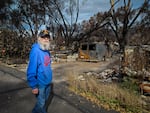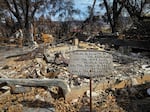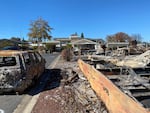In mid-October, 78-year-old Joseph Powell moved back into his mobile home in Talent Mobile Estates. His view had changed since Sept. 8. He used to open his door to towering trees and a community of modest homes. Now he sees torched vehicles, a sea of debris and charred tree limbs standing black against the sky.
Powell’s home survived the Almeda Fire. About 90 others here burned.
“It’s not the same now,” he said. “It’s really lonely. All my friends are gone.”

Joseph Powell stands among his neighbors’ destroyed homes at Talent Mobile Estates in Talent, Ore. on October 13, 2020. Powell’s home is one of a few there that the Almeda Fire left standing.
April Ehrlich / JPR News
When the Almeda Fire tore through the southern Oregon cities of Talent and Phoenix, it incinerated more than 1,000 mobile homes in 18 parks. But the flames were fickle. They spared pockets of homes here and there.
That has left both owners and residents of manufactured home communities with difficult choices. Can they afford to rebuild? Is it safe to move back?
Powell’s mobile home is among about a dozen that remain intact at the park in Talent. Many of his former neighbors are Latino families living on limited incomes. His front porch overlooks several blocks of their decimated homes. A resident for 20 years, Powell can’t imagine living anywhere else. He probably couldn’t find another place in Talent that he could afford.
“It just breaks my heart to think of all these people that lost everything,” Powell said. “I mean, I was just so very fortunate.”
Powell plans to stick around, but other people are scared. The empty park is dark at night. Parents worry about their kids living in a landscape of twisted metal. Some residents whose homes survived feel they’re being forced back, because rent is due on the land beneath their homes. They can’t afford to pay for motel rooms at the same time.
Paying rent in ‘a vast wasteland’
The owner of Talent Mobile Estates, listed as Ho Sung Kim in state records, declined an interview in a message relayed through Commonwealth Real Estate Services, the park’s property management company. But the onsite manager, Debra Herring, said the park needs revenue so it can be there for families who desperately need housing.
“You would pay rent if you went on vacation and your home remained there,” she said. “And we’re a sole individual owner. We’re not a corporation. We’re not a big entity.”
Herring has also moved back into her home at Talent Mobile Estates, where she’s lived for decades. Some of her former neighbors are now homeless, she said. She wants them back.
“I want to wake up from this nightmare and have it be gone,” she said.

The Almeda Fire destroyed about 90 mobile homes at Talent Mobile Estates on Sept. 8, 2020. A handful of residents have moved back.
April Ehrlich / JPR
At this park and others, however, fears for safety extend beyond darkness and debris. Residents with intact homes worry the water isn’t safe to drink and the air isn’t healthy to breathe.
“All of these areas still smell putrid,” said Rep. Pam Marsh, D-Jackson County, in mid-October.
The fact that some mobile homes escaped the flames is wonderful, in her view, but also puts residents in a bind.
“Insurance is not going to cover them. FEMA’s not going to cover them,” Marsh said. “So how do you continue living in or managing your asset when it is sitting right next to a vast wasteland of burned manufactured homes?”
Assessing hazards: ‘It’s not safe for us’
When a fire burns homes, common household items become hazardous waste. Paint, bleach, fertilizer, car batteries, propane tanks — the list goes on. State officials say it’s likely some mobile home debris also contains asbestos.
The first stage of government-led cleanup recently began in Jackson County and is expected to last until December. EPA crews are removing household hazardous waste from residential areas and mobile home parks, which are considered commercial properties. The state is seeking federal permission to include the parks in the second stage of public cleanup as well. That removal of ash and debris from Oregon’s disastrous spate of fires could take another six to 18 months around the state, depending on terrain.
Misty Muñoz isn’t planning to wait. Like Powell, her mobile home still stands, kept company by two more. Beyond that: a swath of destruction.
“There’s just no way,” Muñoz said. “This is not our home anymore. It’s not safe for us.”

Misty Muñoz stands in front of her garden at Medford Estates on October 14, 2020. Muñoz says she doesn’t feel safe living amid dozens of destroyed mobile homes.
April Ehrlich / April Ehrlich / JPR News
Muñoz’s house at Medford Estates in south Medford, just outside of Phoenix, is one of about 90 that survived. It was the first home she ever bought. She added a new deck, installed new windows, and built a large garden for herself and her teenage daughter.
“This was my dream,” Muñoz said standing in her garden. “So, this is a hard — walking away from this — is really hard. But I can’t live here. It’s toxic.”
Cal-Am Properties, which operates manufactured home communities around the country, said it has checked the water at Medford Estates and will test it at least once a month. Muñoz has raised questions about the methodology behind those tests.
Parks' future: to wait, rebuild or redevelop
Cal-Am’s CEO Cory Sukert has promised to temporarily reduce rent for the dozens of homes that escaped the fire intact. However, he seemed unaware, until contacted for this story, that manufactured home communities are eligible for government help with the first stage of cleanup – the removal of household hazardous waste.
The company had been preparing to hire private contractors to remove both hazardous waste and debris, at a price tag of “well over a million dollars,” by Sukert’s estimation.
“I got 80 people that live there right now,” Sukert said of his need to move quickly, “and I don’t think they want to sit there for a year or six months, even, waiting for a cleanup to happen.”

On October 14 — more than a month after the Almeda Fire — burned-out cars and other hazardous debris remained in front of Misty Muñoz’s house at Medford Estates.
April Ehrlich / JPR News
Not all park owners and operators have such deep pockets, though.
Manufactured home communities in Jackson County range from higher-end neighborhoods like Medford Estates to bare-bones trailer parks. In the aftermath of the fire, there’s pressure to preserve the affordable housing the parks provided.
Thomas Kerr co-owns Rogue Valley Mobile Village, an older park devastated by the Almeda Fire. Eight units survived, but without water or sewer service they are uninhabitable. Even if they had utilities, Kerr said he wouldn’t want people to move back in.
“Oh no,” he said. “I mean, you have to see what surrounds them. There’s all kinds of chemicals and hazardous materials around them. There’s too much responsibility and liability that we would have.”
Kerr said he can’t afford to clean the property himself, so he’s waiting to see what the government can do. Officials with the Oregon Office of Emergency Management say the state is considering incurring the cost of clearing ash and debris from mobile home parks, if FEMA doesn’t allow them to be included in the second stage of cleanup.
So Kerr is waiting. He wants to rebuild, he just doesn’t know if a new mobile home park makes economic sense. If he does rebuild the park, he said he can’t keep charging just $500 rent.


